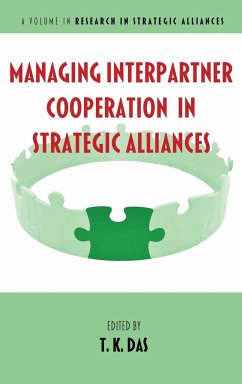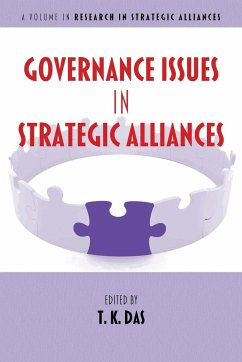Diploma Thesis from the year 1997 in the subject Business economics - Didactics, Economic Pedagogy, grade: 1,0, University of Innsbruck (Sozial- und Wirtschaftswissenschaften), language: English, abstract: Inhaltsangabe:Abstract:
In recent years, we have witnessed a surge of alliances among major corporations throughout the whole world; hardly a day goes by without announcements in the business press of new linkages, partnerships, or alliances. They increasingly involve partners from different parts of the world, are cross-cultural, and don t seem to have a limit.
My curiosity for this phenomenon was captured by the course Collaborative Strategies in International Business , which I frequented at the Aarhus School of Business, Denmark in 1995. One of the articles, that made up the course literature was Gary Hamel s Competition for Competence and Interpartner Learning within International Strategic Alliance (1991). In this influential paper he investigated which role International Strategic Alliances might play in effecting a partial redistribution of skills amongst partners. Furthermore, he found several determinants that influenced the success of interpartner learning. This study was the point of departure for my work. I just wanted to dig deeper into this topic and find answers to the following questions:
What are the motives behind the increasing number of alliance formation?
What role does the increasingly popular Resource-Based View of the firm play?
How do Organizational Learning processes take shape?
Which factors influence the success of learning processes in Strategic Alliances?
What are then the managerial implications for the management of collaborative ventures?
In the following chapters I try to find some answers to these questions. To this aim my paper will be organized in the following way:
In Chapter 2 I will try to explain what a Strategic Alliance is and put forward some definitions. We will see, that this term comprises quite a lot of different forms of interfirm cooperation, from the classical form of Joint Venture to Joint Product Development arrangements. Furthermore, I will discuss some special features of the modern forms of collaboration: They are increasingly formed between direct rivals and also across national boundaries.
Chapter 3 will give an overview of the drivers, that are responsible for the steadily increasing number of alliances. Globalization will be subdivided into four aspects, that have considerable influence on firms and their manager s ways of thinking and acting. The main point of this chapter will be that Strategic Alliances are one way of coping with the challenges that are posed by the ongoing globalization process.
The impact of the above discussed globalization process on corporate strategy is the theme of Chapter 4. I will show that due to these effects a change from the Positioning Approach, as represented by Porter s Five Forces, Value Chain and Generic Strategies, to the Resource-Based Approach resulted. Why is this of any importance to Organizational Learning and Strategic Alliances?, might be the question of the reader. Well, this change provides us also with some valuable insights why alliances have become such a popular instrument in today s business world. Competing on Competences is the new rule of the game and alliances are one way of doing so.
Therefore, in Chapter 5 I elaborate further on the management of core Competences and will explain, that these tasks are also of considerable importance in the management of Strategic Alliances.
In Chapter 6 I turn to Organizational Learning, which is a very important building block of Competences. Besides this relationship, I will discuss the most important ideas surrounding the concept of Organizational Learning and put forward some proposals, how a learning organization can be build.
In the course of Chapter 7 I will presen...
Hinweis: Dieser Artikel kann nur an eine deutsche Lieferadresse ausgeliefert werden.
In recent years, we have witnessed a surge of alliances among major corporations throughout the whole world; hardly a day goes by without announcements in the business press of new linkages, partnerships, or alliances. They increasingly involve partners from different parts of the world, are cross-cultural, and don t seem to have a limit.
My curiosity for this phenomenon was captured by the course Collaborative Strategies in International Business , which I frequented at the Aarhus School of Business, Denmark in 1995. One of the articles, that made up the course literature was Gary Hamel s Competition for Competence and Interpartner Learning within International Strategic Alliance (1991). In this influential paper he investigated which role International Strategic Alliances might play in effecting a partial redistribution of skills amongst partners. Furthermore, he found several determinants that influenced the success of interpartner learning. This study was the point of departure for my work. I just wanted to dig deeper into this topic and find answers to the following questions:
What are the motives behind the increasing number of alliance formation?
What role does the increasingly popular Resource-Based View of the firm play?
How do Organizational Learning processes take shape?
Which factors influence the success of learning processes in Strategic Alliances?
What are then the managerial implications for the management of collaborative ventures?
In the following chapters I try to find some answers to these questions. To this aim my paper will be organized in the following way:
In Chapter 2 I will try to explain what a Strategic Alliance is and put forward some definitions. We will see, that this term comprises quite a lot of different forms of interfirm cooperation, from the classical form of Joint Venture to Joint Product Development arrangements. Furthermore, I will discuss some special features of the modern forms of collaboration: They are increasingly formed between direct rivals and also across national boundaries.
Chapter 3 will give an overview of the drivers, that are responsible for the steadily increasing number of alliances. Globalization will be subdivided into four aspects, that have considerable influence on firms and their manager s ways of thinking and acting. The main point of this chapter will be that Strategic Alliances are one way of coping with the challenges that are posed by the ongoing globalization process.
The impact of the above discussed globalization process on corporate strategy is the theme of Chapter 4. I will show that due to these effects a change from the Positioning Approach, as represented by Porter s Five Forces, Value Chain and Generic Strategies, to the Resource-Based Approach resulted. Why is this of any importance to Organizational Learning and Strategic Alliances?, might be the question of the reader. Well, this change provides us also with some valuable insights why alliances have become such a popular instrument in today s business world. Competing on Competences is the new rule of the game and alliances are one way of doing so.
Therefore, in Chapter 5 I elaborate further on the management of core Competences and will explain, that these tasks are also of considerable importance in the management of Strategic Alliances.
In Chapter 6 I turn to Organizational Learning, which is a very important building block of Competences. Besides this relationship, I will discuss the most important ideas surrounding the concept of Organizational Learning and put forward some proposals, how a learning organization can be build.
In the course of Chapter 7 I will presen...
Hinweis: Dieser Artikel kann nur an eine deutsche Lieferadresse ausgeliefert werden.








